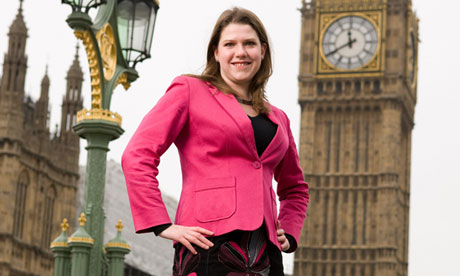
As the latest round of fashion shows kick off in the capital, a very different kind of fashion event is roaring into life in east London. In a loud and crowded venue in Shoreditch, designers, models and bloggers from around the country gather to celebrate the inaugural Official London Plus Size fashion weekend (LPSFW), two days of catwalk shows dedicated solely to larger women.
It is the first event of its kind in the UK, and one which couldn't come soon enough for the women in attendance. Jo Swinson, minister for women and equalities, opened the weekend with a speech which suggested the fashion industry could learn from such an event.
"Twice a year the fashion community descends on London. And rightly so, because we have a huge amount to be proud of with London's fashion industry.
"But I think it says everything that is wrong with the industry that you have a plus-size event for women who are size 12 and over. It shows the fashion industry is not yet appreciating the diversity of beauty in this country," Swinson said.
According to a recent survey by the London College of Fashion, the average British woman is size 14-16.
Buzzwords such as empowerment and celebration pepper the air at the LPSFW, but a rod of steel underpins the air of frivolity. Najma Ali and Keenan Goldstone, two 25-year-olds behind the plus size label One One Three, are here to sell clothes.
"We like lace, sequins, orange leopard print, crop tops – that kind of thing. This," says Ali, picking up a see-through top from their spring/summer collection, "you want to wear with just a bra underneath. Some people say bigger women shouldn't wear this kind of thing but we but we don't listen to those people."
A recent upswing in plus-size blogs, the launch of specialist magazines such as Slink and the success of ranges such as Asos's Curve collection, which saw a 155% lift in sales last year, suggest that larger women are no longer willing to be sidelined by the fashion industry.
LPSFW organiser Rianne Ward runs the weekend with blogger Remi Ray. "There's real passion here. These women want good clothes, they want to look good. And by having the event now, while London fashion week is on, we want to show the possibilities on offer when you acknowledge diversity."
Ward and Ray currently fund the weekend themselves but are hopeful that this will not always be necessary.
Not everyone is thrilled about LPSFW. Sarah Watkinson, of 12+ UK Model management, says: "It's a positive event but we're not involved because our main aim as an agency for plus size models is to promote curvy, healthy girls in a subtle way, not highlight their differences."
Plus size models are less of a rarity on catwalks than they once were; Crystal Renn and Robyn Lawley have modelled for, among others, Chanel, Ralph Lauren and Jimmy Choo. But bigger models are often presented as an exotic addition to a show rather than a signifier of change.
One stylist, speaking on the condition of anonymity, said: "It isn't just high fashion brands that don't want their designs being modelled by larger girls. If I try to call in clothes for anyone above a size 14, you get excuses and unanswered calls. Even high street stores who cater for women above a certain size don't really want that to be advertised."
A common explanation for why models are thinner than your average woman is that sample sizes are made small to save on the cost of making designs. Therefore, models must be a size six or eight to fit them.
Swinson is sceptical about this theory: "The costs of these clothes are about the working hours, not a few inches of cloth.
"The modelling agencies blame the designers, the designers blame costs – no one wants to take responsibility.
"But the British fashion industry has been a pioneer for centuries. We should be at the forefront of change."

